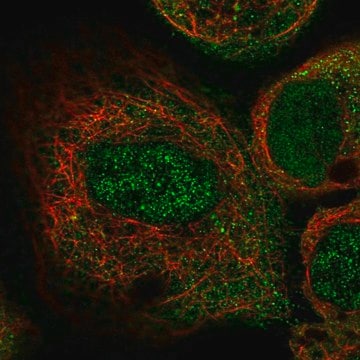MABT162
Anti-Pinch-1 Antibody, clone 9D2.1
clone 9D2.1, from mouse
Synonyme(s) :
LIM and senescent cell antigen-like-containing domain protein 1, Particularly interesting new Cys-His protein 1, PINCH-1, Renal carcinoma antigen NY-REN-48
About This Item
Produits recommandés
Source biologique
mouse
Niveau de qualité
Forme d'anticorps
purified immunoglobulin
Type de produit anticorps
primary antibodies
Clone
9D2.1, monoclonal
Espèces réactives
human, mouse
Technique(s)
immunohistochemistry: suitable
western blot: suitable
Isotype
IgMκ
Numéro d'accès NCBI
Numéro d'accès UniProt
Conditions d'expédition
wet ice
Modification post-traductionnelle de la cible
unmodified
Informations sur le gène
human ... LIMS1(3987)
Description générale
Immunogène
Application
Cell Structure
Adhesion (CAMs)
Qualité
Western Blotting Analysis: 0.5 µg/mL of this antibody detected Pinch-1 in 10 µg of human heart tissue lysate.
Description de la cible
Forme physique
Stockage et stabilité
Remarque sur l'analyse
Human heart tissue lysate
Autres remarques
Clause de non-responsabilité
Vous ne trouvez pas le bon produit ?
Essayez notre Outil de sélection de produits.
Code de la classe de stockage
10 - Combustible liquids
Classe de danger pour l'eau (WGK)
WGK 2
Point d'éclair (°F)
Not applicable
Point d'éclair (°C)
Not applicable
Certificats d'analyse (COA)
Recherchez un Certificats d'analyse (COA) en saisissant le numéro de lot du produit. Les numéros de lot figurent sur l'étiquette du produit après les mots "Lot" ou "Batch".
Déjà en possession de ce produit ?
Retrouvez la documentation relative aux produits que vous avez récemment achetés dans la Bibliothèque de documents.
Notre équipe de scientifiques dispose d'une expérience dans tous les secteurs de la recherche, notamment en sciences de la vie, science des matériaux, synthèse chimique, chromatographie, analyse et dans de nombreux autres domaines..
Contacter notre Service technique








